人教版八年级上册Unit 5 Do you want to watch a game show?(SectionA1a-2d)课件(共47张PPT,内嵌音频)
文档属性
| 名称 | 人教版八年级上册Unit 5 Do you want to watch a game show?(SectionA1a-2d)课件(共47张PPT,内嵌音频) |  | |
| 格式 | pptx | ||
| 文件大小 | 5.9MB | ||
| 资源类型 | 教案 | ||
| 版本资源 | 人教新目标(Go for it)版 | ||
| 科目 | 英语 | ||
| 更新时间 | 2022-11-16 18:30:24 | ||
图片预览

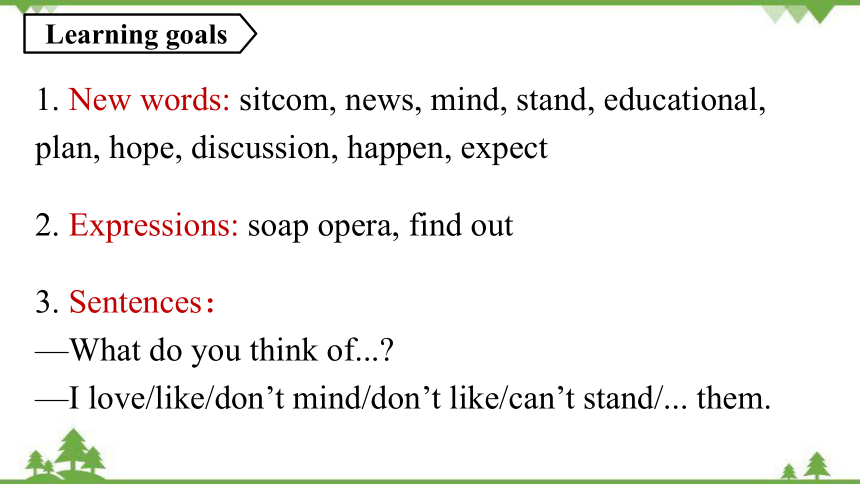
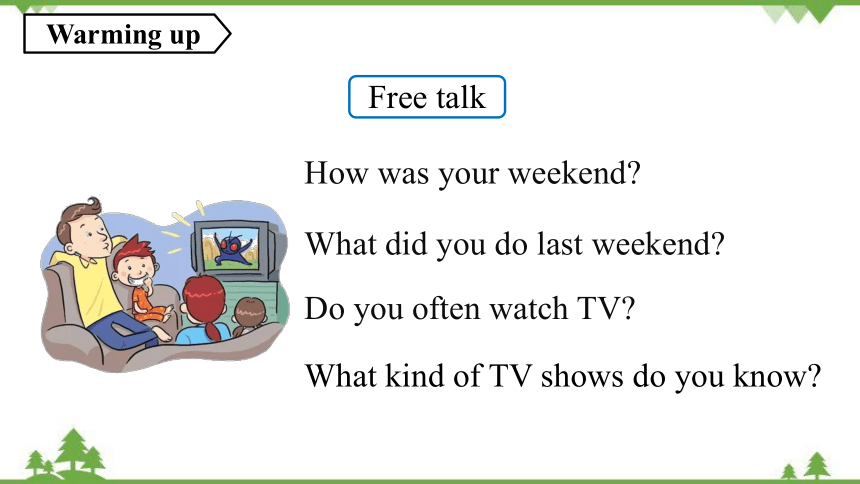
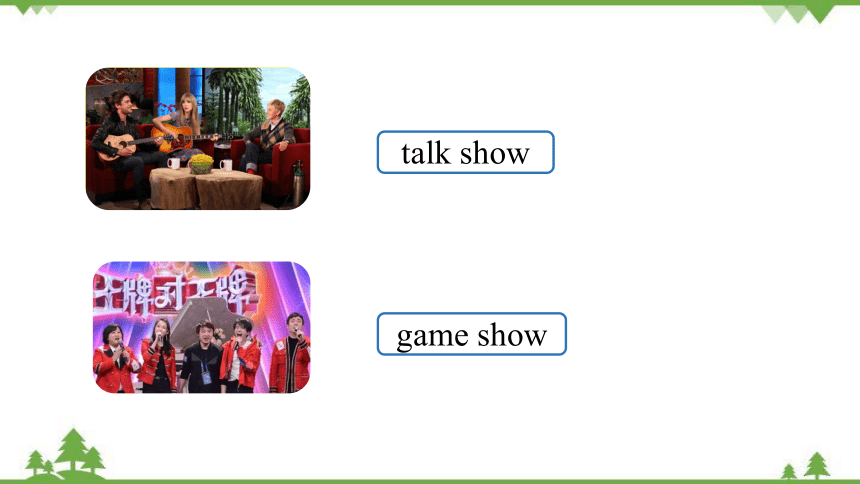



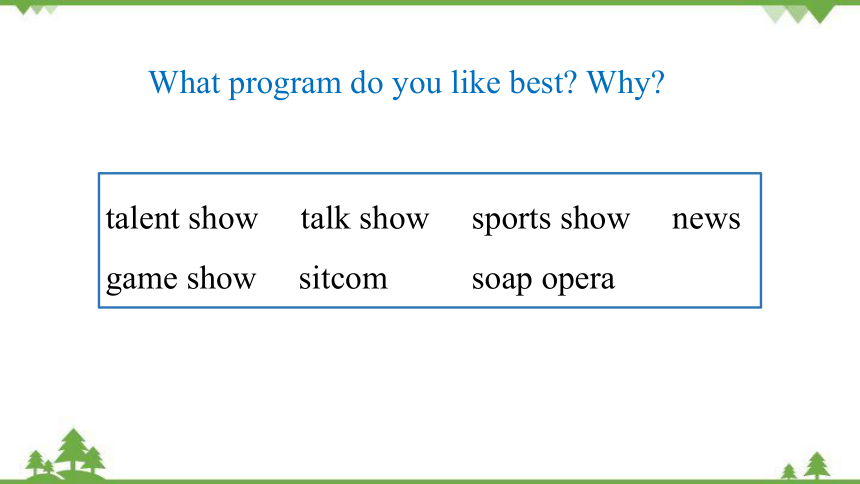
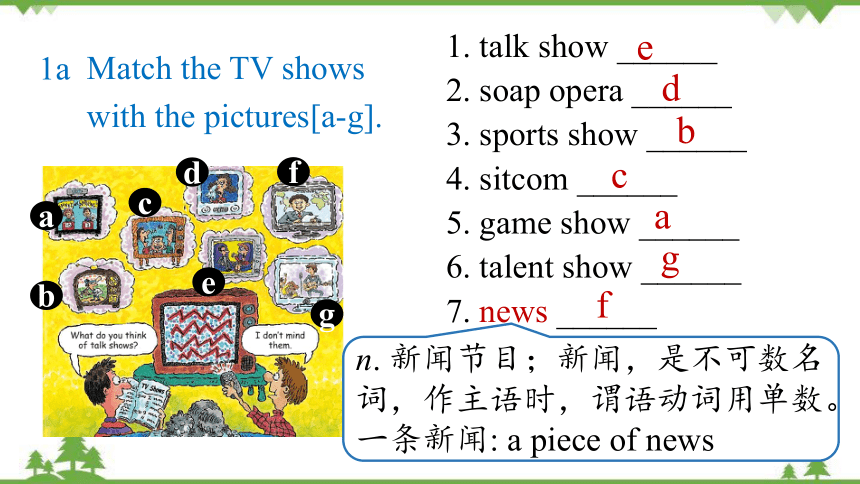
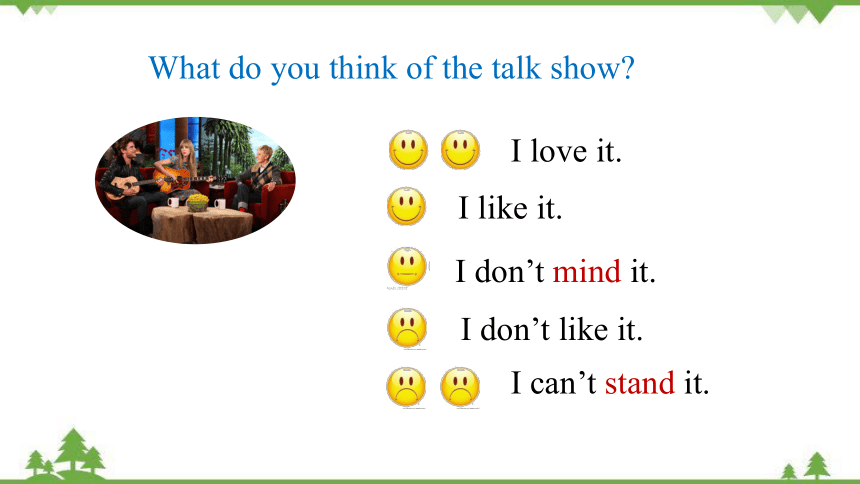
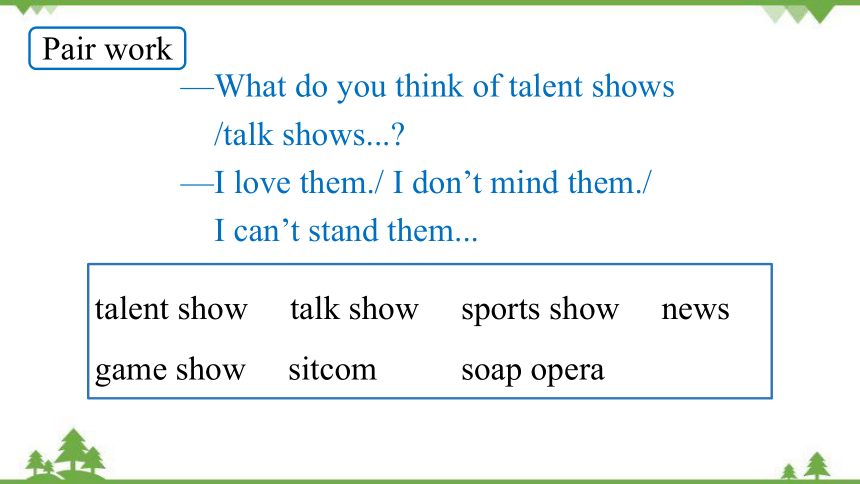

文档简介
(共47张PPT)
Section A 1a-2d
Unit 5 Do you want to watch a game show
初中英语
八年级上册 RJ
1. New words: sitcom, news, mind, stand, educational, plan, hope, discussion, happen, expect
2. Expressions: soap opera, find out
3. Sentences:
—What do you think of...
—I love/like/don’t mind/don’t like/can’t stand/... them.
Learning goals
How was your weekend
What kind of TV shows do you know
What did you do last weekend
Do you often watch TV
Free talk
Warming up
talk show
game show
talent show
sports show
sitcom
news
soap opera
talent show talk show sports show news game show sitcom soap opera
What program do you like best Why
1. talk show ______
2. soap opera ______
3. sports show ______
4. sitcom ______
5. game show ______
6. talent show ______
7. news ______
Match the TV shows with the pictures[a-g].
e
d
b
c
a
g
f
a
b
c
d
e
f
g
1a
n. 新闻节目;新闻,是不可数名词,作主语时,谓语动词用单数。一条新闻: a piece of news
I love it.
I like it.
I don’t mind it.
I don’t like it.
I can’t stand it.
What do you think of the talk show
—What do you think of talent shows
/talk shows...
—I love them./ I don’t mind them./
I can’t stand them...
Pair work
talent show talk show sports show news game show sitcom soap opera
1. What do you think of talk shows (教材P33 图片文字)
What do you think of... 你认为……怎么样
“What do you think of... ”相当于“ How do you like... ”或“How do you feel about... ”,常用来询问对方对某事/某人的看法。
—What do you think of this movie
—Pretty good. /I don’t like it.
Language points
—How do you like/feel about the dress
—It’s very beautiful.
—What do you think of flying a kite in the park
—It’s wonderful.
Tips: 该句型中的 of 为介词,其后若接动词,要用动词-ing形式。
2. I don’t mind them. (教材P33 1c)
mind v. 介意;对(某事)烦恼
mind在此处作动词,常用于疑问句、否定句或条件句中,后接名词、代词或动词-ing形式。
【拓展】含mind的常用句型有:
Would you mind if sb. do(es) sth.
如果某人做某事,你介意吗?
Would you mind (sb./sb.’s) doing sth.
你介意(某人)做某事吗?
—Would you mind repeating what you said, Diana
—No, of course not.
回答上面两个句型时,表示“不介意”用“Not at all./ Certainly not./ Of course not.”等; 表示“介意”用“I’m sorry, but…/Sorry, you’d better not./ I’m afraid you can’t.”等。
Listen and number the shows[1-4] in the order you hear them.
____ talent show ____ talk show
____ soccer game ____ news
2
4
1
3
1b
Listen again and answer the questions.
1. What does Mark plan to do tonight
2. What does Jack think of talk shows
3. Does Jack like the news
4. What does Jack think of talent show
5. Does Mark want to watch the soccer game at 5:00 How about Jack
Listen and read.
Mark: Hey, Jack, I plan to watch TV tonight. Do you want
to join me
Jack: Sure. What do you want to watch
Mark: Well, what do you think of talk shows
Jack: I don’t mind them, but sometimes they can be a bit
boring.
Mark: That’s true. Do you want to just watch the news
plan to do sth.计划做某事
mind sth. 介意某事
Jack: I guess so. Maybe we can watch that new talent
show after the news. I usually can’t stand talent
shows, but that one is quite funny.
Mark: OK, sure, but the soccer game starts at 5:00 p.m.
Jack: Oh, yeah, I want to watch that game, too.
want to do sth.想要做某事
Practice the conversation. Then make your own conversations.
love like
don’t mind don’t like
can’t stand
A: What do you want to watch
B: What do you think of talk shows
A: They’re OK. I don’t mind them.
B: Then let’s watch a talk show.
1c
3. can’t stand (教材P33 1c)
stand v. 忍受;站立
(1) stand在此处作动词,意为“忍受”,常用于否定句或疑问句中。其常用结构有:
If you can’t stand the heat, get out of the kitchen.
I can’t stand my neighbors arguing loudly late at night.
can’t stand (sb.) doing sth. 不能忍受(某人)做某事
can’t stand sb. /sth. 不能忍受某人/某事
Language points
(2) stand作动词,还可意为“站立”。
She was too weak to stand.
【拓展】stand 作动词,还可表示“位于(某处)”。
An old apple tree once stood here.
1. How many people are there in the picture
2. Where are they What are they doing
3. What are they probably talking about
Look at the picture and answer.
Listen to Lin Hui and Sally’s conversation. Number the TV show[1-5] in the order you hear them.
_____ sitcoms _____ game shows
_____ soap operas _____ news
_____ talk shows
1
2
4
3
5
2a
2b Listen again. Complete the sentences.
1. Sally likes to watch ___________________.
2. Lin Hui thinks she can learn ______________from sitcoms.
3. Sally thinks __________are more educational than sitcoms.
4. Sally loves __________. She plans to watch Days of Our Past ______.
the news or talk shows
game shows
soap operas
tonight
some great jokes
n. education教育/educator教育工作者
v. educate 教育;教导
4. She plans to watch Days of Our Past tonight. (教材P34 2b)
plan v. & n. 打算;计划
(1) plan在此处作动词,常用结构:
Lisa plans to draw a new picture next week.
When do you plan on going to Paris
plan on doing sth.打算做某事
plan to do sth. 计划/打算做某事
Language points
(2) plan还可作可数名词,意为“打算;计划”。make a plan “制订一个计划”。
【谚】The plan for a year lies in spring.
Listen again and answer the questions.
1. What does Lin Hui think of sitcom
2. Does Sally like sitcoms Why
3. What kind of TV shows does Sally like
4. What does Sally think of game shows
5. What does Sally think of soap operas
6. What does Sally plan to watch tonight
Listen and read.
Sally: Hi, Lin Hui. What are you watching
Lin Hui: Hey, Sally. I’m watching a really funny sitcom.
Sally: Oh, I don’t like sitcoms. What can you expect to
learn from them I like to watch the news or talk
shows.
Lin Hui: Watching sitcoms is a great way to relax! You can
learn some great jokes, too.
Sally: Well, I like shows that are more educational. I think
even game shows are better than sitcoms. You can
try to guess the answers to the questions.
Lin Hui: Then what do you think of soap operas
Sally: Oh, umm, well, I know you can’t expect to learn
much from soap operas, but I have to say I love
watching them! I plan to watch Days of Our Past
tonight.
Ask and answer questions about the TV shows in 2a. Use information that is true for you.
A: Do you plan to watch the news tonight
B: Yes. I like watching the news. I watch it every night.
A: Why
B: Because I hope to find out what's going on around the world.
2c
5. Because I hope to find out what’s going on around the world. (教材P34 2c)
find 找到;发现 强调寻找的结果
find out 查明;弄清 指通过思考、调查或研究后搞清楚、弄明白
Language points
【易混辨析】find与 find out
find out 查明;弄清
【拓展】“动词+ out”型的其他短语:
go out 熄灭
put out 扑灭
look out 当心
hand out 分发
run out 用光;耗尽
take out 取出
work out 解决;算出
give out 分发;散发
动词+out
I found a watch on the ground. I wanted to find out who lost it.
Grace: What did you do in class today, Sarah
Sarah: We had a discussion about TV shows.
My classmates like game shows and
sports shows.
Grace: Oh, I can’t stand them. I love soap operas. I like to
follow the story and see what happens next.
v. 发生;出现 happen常指偶然发生,
take place指根据安排或计划发生。
v. 跟随;跟着
Role-play the conversation.
2d
Sarah: Well, I don’t mind soap operas. But my favorite TV
shows are the news and talk shows.
Grace: They’re boring!
Sarah: Well, they may not be very exciting,
but you can expect to learn a lot from them. I hope
to be a TV reporter one day.
Read 2d and answer the questions.
1. What are Grace and Sarah talking about
2. What kind of TV shows do Sarah’s classmates like
3. What does Grace think of game shows and sports show
4. What does Grace think of soap operas What does Sarah think of them
5. What are Sarah’s favorite TV shows Why does she like them What does Grace think of them
6. We had a discussion about TV shows. (教材P34 2d)
discussion n. 讨论;商量
discussion作名词,由“discuss(v. 讨论) + -ion(名词后缀)”构成,其常用结构有:
Could I have a discussion with my classmates first
We had a discussion about the basketball game yesterday.
Language points
have a discussion with sb. 和某人讨论
have a discussion about sth. 就某事展开讨论
7. Well, they may not be very exciting, but you can expect to learn a lot from them. (教材P34 2d )
expect v. 预料;期待
expect作动词,常见用法有:
◆ expect sth./sb. 期待/等待某事/某人
◆ expect to do sth. 期望/指望做某事
◆ expect sb. to do sth. 期望/预料某人做某事
◆ expect+that从句 预料……
I was expecting him yesterday.
I expect to see him tomorrow.
You can’t expect to learn a foreign language in a few months.
I expect my brother to take me to the zoo.
Many people expected that the peace talks would break down.
Grace and Sarah are having a discussion about ...
Sarah’s classmates like ... and ..., but Grace ...
Grace loves ..., but Sarah ...
Sarah loves ... and ..., but Grace thinks they are ...
Sarah hopes to be a ... one day.
Retell
1. (2020·吉林中考) Lisa plans a new picture next week.
A. draw B. to draw C. drawing
2. (兰州中考) Bob’s father can’t stand ___ soap operas. He enjoys sports games on TV.
A. watch B. to watch
C. watching D. watched
一、单项选择
B
C
Exercises
3. (2020·云南中考) —What do you think of TV shows
—They are OK. .
A. I don’t think so B. I can’t agree
C. I don’t mind them D. I can’t stand them
4. (河北中考) We need to do some research to ____ the answer.
A. find out B. look out
C. hand out D. take out
C
A
1. (2020·青岛中考改编) Teachers expect all their students
(make) progress day by day.
2. The students are having a __________ (discuss) about how to learn English well.
3. I hope _________ (watch) the action movie one day.
二、用括号内所给词的适当形式填空。
to make
discussion
to watch
4. We plan ______ (go) to Shanghai this weekend.
5. The children had a happy and (education) day.
educational
to go
Key words
Useful
expressions
soap opera, think of, plan to, hope to,find out
Sentences
—What do you think of...
—I love/like/don’t mind/don’t like/ can't stand... them.
sitcom, news, mind, stand,educational, plan, hope, discussion, happen, expect
Summary
1. Ask classmates what they think of some TV shows and make a dialogue.
2. Preview the new words and phrases in Section A (Grammar Focus-3c).
Homework
THANKS
谢谢聆听!
Section A 1a-2d
Unit 5 Do you want to watch a game show
初中英语
八年级上册 RJ
1. New words: sitcom, news, mind, stand, educational, plan, hope, discussion, happen, expect
2. Expressions: soap opera, find out
3. Sentences:
—What do you think of...
—I love/like/don’t mind/don’t like/can’t stand/... them.
Learning goals
How was your weekend
What kind of TV shows do you know
What did you do last weekend
Do you often watch TV
Free talk
Warming up
talk show
game show
talent show
sports show
sitcom
news
soap opera
talent show talk show sports show news game show sitcom soap opera
What program do you like best Why
1. talk show ______
2. soap opera ______
3. sports show ______
4. sitcom ______
5. game show ______
6. talent show ______
7. news ______
Match the TV shows with the pictures[a-g].
e
d
b
c
a
g
f
a
b
c
d
e
f
g
1a
n. 新闻节目;新闻,是不可数名词,作主语时,谓语动词用单数。一条新闻: a piece of news
I love it.
I like it.
I don’t mind it.
I don’t like it.
I can’t stand it.
What do you think of the talk show
—What do you think of talent shows
/talk shows...
—I love them./ I don’t mind them./
I can’t stand them...
Pair work
talent show talk show sports show news game show sitcom soap opera
1. What do you think of talk shows (教材P33 图片文字)
What do you think of... 你认为……怎么样
“What do you think of... ”相当于“ How do you like... ”或“How do you feel about... ”,常用来询问对方对某事/某人的看法。
—What do you think of this movie
—Pretty good. /I don’t like it.
Language points
—How do you like/feel about the dress
—It’s very beautiful.
—What do you think of flying a kite in the park
—It’s wonderful.
Tips: 该句型中的 of 为介词,其后若接动词,要用动词-ing形式。
2. I don’t mind them. (教材P33 1c)
mind v. 介意;对(某事)烦恼
mind在此处作动词,常用于疑问句、否定句或条件句中,后接名词、代词或动词-ing形式。
【拓展】含mind的常用句型有:
Would you mind if sb. do(es) sth.
如果某人做某事,你介意吗?
Would you mind (sb./sb.’s) doing sth.
你介意(某人)做某事吗?
—Would you mind repeating what you said, Diana
—No, of course not.
回答上面两个句型时,表示“不介意”用“Not at all./ Certainly not./ Of course not.”等; 表示“介意”用“I’m sorry, but…/Sorry, you’d better not./ I’m afraid you can’t.”等。
Listen and number the shows[1-4] in the order you hear them.
____ talent show ____ talk show
____ soccer game ____ news
2
4
1
3
1b
Listen again and answer the questions.
1. What does Mark plan to do tonight
2. What does Jack think of talk shows
3. Does Jack like the news
4. What does Jack think of talent show
5. Does Mark want to watch the soccer game at 5:00 How about Jack
Listen and read.
Mark: Hey, Jack, I plan to watch TV tonight. Do you want
to join me
Jack: Sure. What do you want to watch
Mark: Well, what do you think of talk shows
Jack: I don’t mind them, but sometimes they can be a bit
boring.
Mark: That’s true. Do you want to just watch the news
plan to do sth.计划做某事
mind sth. 介意某事
Jack: I guess so. Maybe we can watch that new talent
show after the news. I usually can’t stand talent
shows, but that one is quite funny.
Mark: OK, sure, but the soccer game starts at 5:00 p.m.
Jack: Oh, yeah, I want to watch that game, too.
want to do sth.想要做某事
Practice the conversation. Then make your own conversations.
love like
don’t mind don’t like
can’t stand
A: What do you want to watch
B: What do you think of talk shows
A: They’re OK. I don’t mind them.
B: Then let’s watch a talk show.
1c
3. can’t stand (教材P33 1c)
stand v. 忍受;站立
(1) stand在此处作动词,意为“忍受”,常用于否定句或疑问句中。其常用结构有:
If you can’t stand the heat, get out of the kitchen.
I can’t stand my neighbors arguing loudly late at night.
can’t stand (sb.) doing sth. 不能忍受(某人)做某事
can’t stand sb. /sth. 不能忍受某人/某事
Language points
(2) stand作动词,还可意为“站立”。
She was too weak to stand.
【拓展】stand 作动词,还可表示“位于(某处)”。
An old apple tree once stood here.
1. How many people are there in the picture
2. Where are they What are they doing
3. What are they probably talking about
Look at the picture and answer.
Listen to Lin Hui and Sally’s conversation. Number the TV show[1-5] in the order you hear them.
_____ sitcoms _____ game shows
_____ soap operas _____ news
_____ talk shows
1
2
4
3
5
2a
2b Listen again. Complete the sentences.
1. Sally likes to watch ___________________.
2. Lin Hui thinks she can learn ______________from sitcoms.
3. Sally thinks __________are more educational than sitcoms.
4. Sally loves __________. She plans to watch Days of Our Past ______.
the news or talk shows
game shows
soap operas
tonight
some great jokes
n. education教育/educator教育工作者
v. educate 教育;教导
4. She plans to watch Days of Our Past tonight. (教材P34 2b)
plan v. & n. 打算;计划
(1) plan在此处作动词,常用结构:
Lisa plans to draw a new picture next week.
When do you plan on going to Paris
plan on doing sth.打算做某事
plan to do sth. 计划/打算做某事
Language points
(2) plan还可作可数名词,意为“打算;计划”。make a plan “制订一个计划”。
【谚】The plan for a year lies in spring.
Listen again and answer the questions.
1. What does Lin Hui think of sitcom
2. Does Sally like sitcoms Why
3. What kind of TV shows does Sally like
4. What does Sally think of game shows
5. What does Sally think of soap operas
6. What does Sally plan to watch tonight
Listen and read.
Sally: Hi, Lin Hui. What are you watching
Lin Hui: Hey, Sally. I’m watching a really funny sitcom.
Sally: Oh, I don’t like sitcoms. What can you expect to
learn from them I like to watch the news or talk
shows.
Lin Hui: Watching sitcoms is a great way to relax! You can
learn some great jokes, too.
Sally: Well, I like shows that are more educational. I think
even game shows are better than sitcoms. You can
try to guess the answers to the questions.
Lin Hui: Then what do you think of soap operas
Sally: Oh, umm, well, I know you can’t expect to learn
much from soap operas, but I have to say I love
watching them! I plan to watch Days of Our Past
tonight.
Ask and answer questions about the TV shows in 2a. Use information that is true for you.
A: Do you plan to watch the news tonight
B: Yes. I like watching the news. I watch it every night.
A: Why
B: Because I hope to find out what's going on around the world.
2c
5. Because I hope to find out what’s going on around the world. (教材P34 2c)
find 找到;发现 强调寻找的结果
find out 查明;弄清 指通过思考、调查或研究后搞清楚、弄明白
Language points
【易混辨析】find与 find out
find out 查明;弄清
【拓展】“动词+ out”型的其他短语:
go out 熄灭
put out 扑灭
look out 当心
hand out 分发
run out 用光;耗尽
take out 取出
work out 解决;算出
give out 分发;散发
动词+out
I found a watch on the ground. I wanted to find out who lost it.
Grace: What did you do in class today, Sarah
Sarah: We had a discussion about TV shows.
My classmates like game shows and
sports shows.
Grace: Oh, I can’t stand them. I love soap operas. I like to
follow the story and see what happens next.
v. 发生;出现 happen常指偶然发生,
take place指根据安排或计划发生。
v. 跟随;跟着
Role-play the conversation.
2d
Sarah: Well, I don’t mind soap operas. But my favorite TV
shows are the news and talk shows.
Grace: They’re boring!
Sarah: Well, they may not be very exciting,
but you can expect to learn a lot from them. I hope
to be a TV reporter one day.
Read 2d and answer the questions.
1. What are Grace and Sarah talking about
2. What kind of TV shows do Sarah’s classmates like
3. What does Grace think of game shows and sports show
4. What does Grace think of soap operas What does Sarah think of them
5. What are Sarah’s favorite TV shows Why does she like them What does Grace think of them
6. We had a discussion about TV shows. (教材P34 2d)
discussion n. 讨论;商量
discussion作名词,由“discuss(v. 讨论) + -ion(名词后缀)”构成,其常用结构有:
Could I have a discussion with my classmates first
We had a discussion about the basketball game yesterday.
Language points
have a discussion with sb. 和某人讨论
have a discussion about sth. 就某事展开讨论
7. Well, they may not be very exciting, but you can expect to learn a lot from them. (教材P34 2d )
expect v. 预料;期待
expect作动词,常见用法有:
◆ expect sth./sb. 期待/等待某事/某人
◆ expect to do sth. 期望/指望做某事
◆ expect sb. to do sth. 期望/预料某人做某事
◆ expect+that从句 预料……
I was expecting him yesterday.
I expect to see him tomorrow.
You can’t expect to learn a foreign language in a few months.
I expect my brother to take me to the zoo.
Many people expected that the peace talks would break down.
Grace and Sarah are having a discussion about ...
Sarah’s classmates like ... and ..., but Grace ...
Grace loves ..., but Sarah ...
Sarah loves ... and ..., but Grace thinks they are ...
Sarah hopes to be a ... one day.
Retell
1. (2020·吉林中考) Lisa plans a new picture next week.
A. draw B. to draw C. drawing
2. (兰州中考) Bob’s father can’t stand ___ soap operas. He enjoys sports games on TV.
A. watch B. to watch
C. watching D. watched
一、单项选择
B
C
Exercises
3. (2020·云南中考) —What do you think of TV shows
—They are OK. .
A. I don’t think so B. I can’t agree
C. I don’t mind them D. I can’t stand them
4. (河北中考) We need to do some research to ____ the answer.
A. find out B. look out
C. hand out D. take out
C
A
1. (2020·青岛中考改编) Teachers expect all their students
(make) progress day by day.
2. The students are having a __________ (discuss) about how to learn English well.
3. I hope _________ (watch) the action movie one day.
二、用括号内所给词的适当形式填空。
to make
discussion
to watch
4. We plan ______ (go) to Shanghai this weekend.
5. The children had a happy and (education) day.
educational
to go
Key words
Useful
expressions
soap opera, think of, plan to, hope to,find out
Sentences
—What do you think of...
—I love/like/don’t mind/don’t like/ can't stand... them.
sitcom, news, mind, stand,educational, plan, hope, discussion, happen, expect
Summary
1. Ask classmates what they think of some TV shows and make a dialogue.
2. Preview the new words and phrases in Section A (Grammar Focus-3c).
Homework
THANKS
谢谢聆听!
同课章节目录
- Unit 1 Where did you go on vacation?
- Section A
- Section B
- Unit 2 How often do you exercise?
- Section A
- Section B
- Unit 3 I'm more outgoing than my sister.
- Section A
- Section B
- Unit 4 What's the best movie theater?
- Section A
- Section B
- Unit 5 Do you want to watch a game show?
- Section A
- Section B
- Unit 6 I'm going to study computer science.
- Section A
- Section B
- Unit 7 Will people have robots?
- Section A
- Section B
- Unit 8 How do you make a banana milk shake?
- Section A
- Section B
- Unit 9 Can you come to my party?
- Section A
- Section B
- Unit 10 If you go to the party, you'll have a grea
- Section A
- Section B
